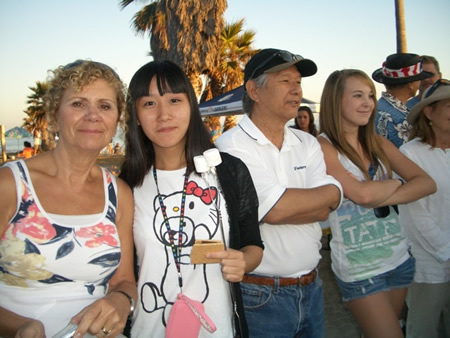By Kellie Hall, Special to the Independent

An exchange organization, Compass U.S.A., is still looking for families to host teenage female Japanese students from Tuesday, July 22 until Sunday, Aug. 10 in South Orange County. Though historically few families from Laguna Beach have participated, the organization is trying to change that this year.
Each summer for more than 30 years students from the all-girls Aikoku School in Tokyo have come to visit southern California and to improve their English skills by staying with a host family.
Compass U.S.A., based in Colorado, works to place students with home-stay families and to plan excursions, including a trip to Disneyland, a sea cruise in Dana Point, and, for the first time, a visit to the Sawdust Arts and Crafts Festival, according to Patty Drewes, program co-ordinator for Compass U.S.A.
Though host families receive information packets and attend an informational session before hosting their student, the girls tend to be more savvy about American culture than Compass U.S.A. led them to believe, said Chuck Gibbons, of Laguna Niguel.

Empty nesters with two children in their 30s, Gibbons and his wife Susan, have enjoyed the company of their Japanese exchange student for the past two summers. They tend to know a great deal about American culture, especially pop culture. One of their past students requested a frappuccino from Starbucks right off the bat, Gibbons remembered.
The girls seem eager to eat American cuisine, refusing fish and sushi in favor of chicken, beef, or, “a real big treat for them,” hotdogs, Gibbons said. They “usually gain a few pounds,” Drewes said.
Getting one of her former “daughters” out of her comfort zone was another one of the joys of the program for Kiki Macdonald of San Juan Capistrano.
Hosts receive applications that note the students’ interests and choose their guest based on this sheet. Macdonald’s student had noted on her application that she hated the outdoors and bugs, a little glitch for Macdonald’s “super outdoorsy” family of two teenage daughters. Yet, after one day in Mammoth, she was walking in the dirt with no shoes, collecting bugs, and gutting fish.
It was foreign to the city-dwelling student, who had experienced little of the outdoors before her trip but host families have the opportunity to expose their students to entirely new experiences, Macdonald said.
One challenge hosts face was drawing their students out of their shells. Though all the visiting students have studied English for at least four years, some have difficulty speaking and often stay silent, Drewes noted. Yet, this silence does not stem from their nascent English skills alone, but quiet may be a Japanese cultural value, Gibbons speculated. Chatty parents be forewarned.
Students’ silence and agreeability have led to problems in the past, as students sometimes misunderstand their hosts’ requests and nod in agreement.
Google Translate, an online program which translates text from one language to another instantaneously, proved a “lifesaver” for Gibbons. Yet, at least one family experienced problems with the service, as one parent attempted to use the program and the translation ended up making the student cry. Fortunately, translators come along with the group and are on-call in case a misunderstanding arises between family and student, Drewes stated.
All potential hosts are evaluated by Compass U.S.A., which includes a background check and a home-visit. There is a small stipend of $225.
Though the students are frequently gone during the daytime on excursions, there is still responsibility for the host families, Drewes noted. Families provide meals for the girls, make arrangements for the student to come with them if they travel, and need to treat her like another one of their children.
This program can be a true culture exchange, with host families benefitting as well as the student, Macdonald said. The girls are incredibly gracious, even those of modest means bring many gifts, and some parents surely hope that the well-mannered Japanese teenagers rub off on their own children, Drewes joked.
Though initially hesitant about the prospect of housing a foreign student with limited communication skills in her home, Macdonald signed up for a second year. Both students and parents are nervous on the first day, but ended up crying on the last, Macdonald said.
Patty Drewes can be reached at 949 412-4112 or [email protected].





[…] Source […]